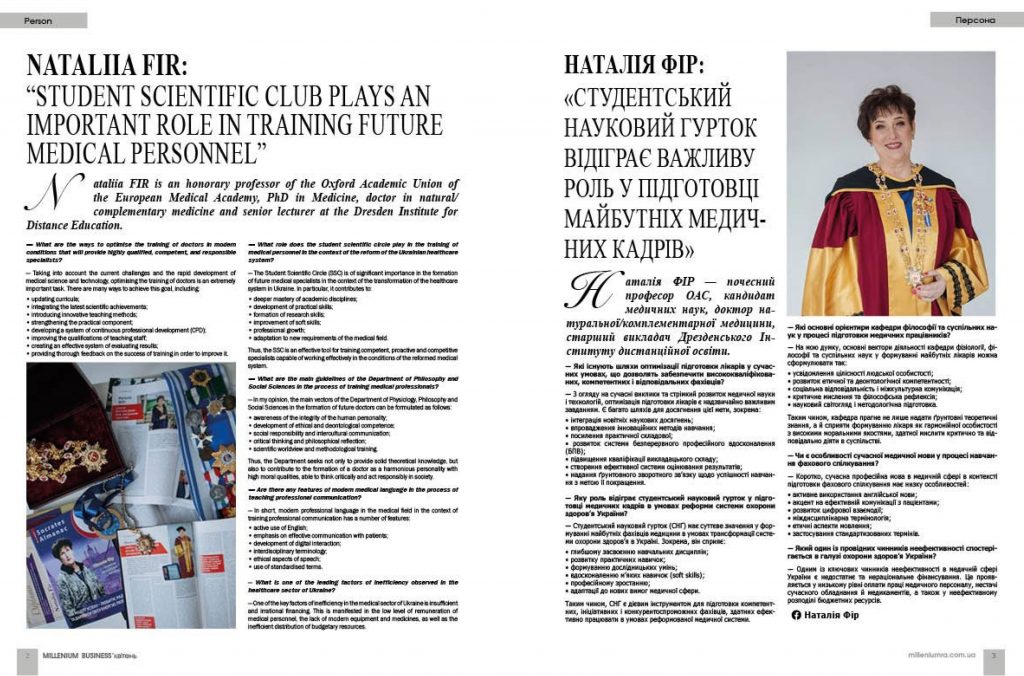Наталія ФІР — почесний професор ОАС, кандидат медичних наук, доктор натуральної/комплементарної медицини, старший викладач Дрезденського Інституту дистанційної освіти.

— Які існують шляхи оптимізації підготовки лікарів у сучасних умовах, що дозволять забезпечити висококваліфікованих, компетентних і відповідальних фахівців?
— З огляду на сучасні виклики та стрімкий розвиток медичної науки і технологій, оптимізація підготовки лікарів є надзвичайно важливим завданням. Є багато шляхів для досягнення цієї мети, зокрема:
- інтеграція новітніх наукових досягнень;
- впровадження інноваційних методів навчання;
- посилення практичної складової;
- розвиток системи безперервного професійного вдосконалення (БПВ);
- підвищення кваліфікації викладацького складу;
- створення ефективної системи оцінювання результатів;
- надання ґрунтовного зворотного зв’язку щодо успішності навчання з метою її покращення.
— Яку роль відіграє студентський науковий гурток у підготовці медичних кадрів в умовах реформи системи охорони здоров’я України?
— Студентський науковий гурток (СНГ) має суттєве значення у формуванні майбутніх фахівців медицини в умовах трансформації системи охорони здоров’я в Україні. Зокрема, він сприяє: - глибшому засвоєнню навчальних дисциплін;
- розвитку практичних навичок;
- формуванню дослідницьких умінь;
- вдосконаленню м’яких навичок (soft skills);
- професійному зростанню;
- адаптації до нових вимог медичної сфери.
Таким чином, СНГ є дієвим інструментом для підготовки компетентних, ініціативних і конкурентоспроможних фахівців, здатних ефективно працювати в умовах реформованої медичної системи.
— Які основні орієнтири кафедри філософії та суспільних наук у процесі підготовки медичних працівників?
— На мою думку, основні вектори діяльності кафедри фізіології, філософії та суспільних наук у формуванні майбутніх лікарів можна сформулювати так: - усвідомлення цілісності людської особистості;
- розвиток етичної та деонтологічної компетентності;
- соціальна відповідальність і міжкультурна комунікація;
- критичне мислення та філософська рефлексія;
- науковий світогляд і методологічна підготовка.
Таким чином, кафедра прагне не лише надати ґрунтовні теоретичні знання, а й сприяти формуванню лікаря як гармонійної особистості з високими моральними якостями, здатної мислити критично та відповідально діяти в суспільстві.
— Чи є особливості сучасної медичної мови у процесі навчання фахового спілкування?
— Коротко, сучасна професійна мова в медичній сфері в контексті підготовки фахового спілкування має низку особливостей: - активне використання англійської мови;
- акцент на ефективній комунікації з пацієнтами;
- розвиток цифрової взаємодії;
- міждисциплінарна термінологія;
- етичні аспекти мовлення;
- застосування стандартизованих термінів.
— Який один із провідних чинників неефективності спостерігається в галузі охорони здоров’я України?
— Одним із ключових чинників неефективності в медичній сфері України є недостатнє та нераціональне фінансування. Це проявляється у низькому рівні оплати праці медичного персоналу, нестачі сучасного обладнання й медикаментів, а також у неефективному розподілі бюджетних ресурсів.
NATALIIA FIR: “STUDENT SCIENTIFIC CLUB PLAYS AN IMPORTANT ROLE IN TRAINING FUTURE MEDICAL PERSONNEL”
Nataliia FIR is an honorary professor of the Oxford Academic Union of the European Medical Academy, PhD in Medicine, doctor in natural/complementary medicine and senior lecturer at the Dresden Institute for Distance Education.
— What are the ways to optimise the training of doctors in modern conditions that will provide highly qualified, competent, and responsible specialists?
— Taking into account the current challenges and the rapid development of medical science and technology, optimising the training of doctors is an extremely important task. There are many ways to achieve this goal, including:
- updating curricula;
- integrating the latest scientific achievements;
- introducing innovative teaching methods;
- strengthening the practical component;
- developing a system of continuous professional development (CPD);
- improving the qualifications of teaching staff;
- creating an effective system of evaluating results;
- providing thorough feedback on the success of training in order to improve it.
— What role does the student scientific circle play in the training of medical personnel in the context of the reform of the Ukrainian healthcare system?
— The Student Scientific Circle (SSC) is of significant importance in the formation of future medical specialists in the context of the transformation of the healthcare system in Ukraine. In particular, it contributes to: - deeper mastery of academic disciplines;
- development of practical skills;
- formation of research skills;
- improvement of soft skills;
- professional growth;
- adaptation to new requirements of the medical field.
Thus, the SSC is an effective tool for training competent, proactive and competitive specialists capable of working effectively in the conditions of the reformed medical system.
— What are the main guidelines of the Department of Philosophy and Social Sciences in the process of training medical professionals?
— In my opinion, the main vectors of the Department of Physiology, Philosophy and Social Sciences in the formation of future doctors can be formulated as follows: - awareness of the integrity of the human personality;
- development of ethical and deontological competence;
- social responsibility and intercultural communication;
- critical thinking and philosophical reflection;
- scientific worldview and methodological training.
Thus, the Department seeks not only to provide solid theoretical knowledge, but also to contribute to the formation of a doctor as a harmonious personality with high moral qualities, able to think critically and act responsibly in society.
— Are there any features of modern medical language in the process of teaching professional communication?
— In short, modern professional language in the medical field in the context of training professional communication has a number of features: - active use of English;
- emphasis on effective communication with patients;
- development of digital interaction;
- interdisciplinary terminology;
- ethical aspects of speech;
- use of standardised terms.
— What is one of the leading factors of inefficiency observed in the healthcare sector of Ukraine?
— One of the key factors of inefficiency in the medical sector of Ukraine is insufficient and irrational financing. This is manifested in the low level of remuneration of medical personnel, the lack of modern equipment and medicines, as well as the inefficient distribution of budgetary resources.
